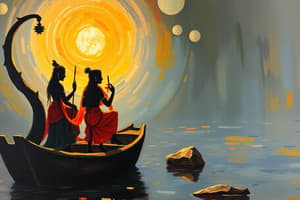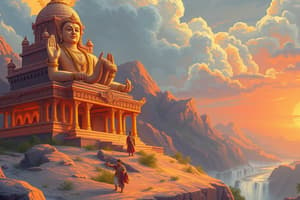Podcast
Questions and Answers
Who is considered the founder of Daoism?
Who is considered the founder of Daoism?
- Confucius
- Laozi (correct)
- Zhuangzi
- Abraham
What does the term 'qi' represent in Daoism?
What does the term 'qi' represent in Daoism?
- Energy or breath transforming all things (correct)
- The natural order of the universe
- The duality of existence
- The ultimate goal of inner peace
What is the primary text of Daoism?
What is the primary text of Daoism?
- The Analects
- Dao de Jing (correct)
- Torah
- Zhuangzi
Which of the following best describes the concept of 'wu-wei' in Daoism?
Which of the following best describes the concept of 'wu-wei' in Daoism?
What role did Moses play in Judaism according to the content?
What role did Moses play in Judaism according to the content?
What is the significance of the Ten Commandments in Judaism?
What is the significance of the Ten Commandments in Judaism?
Which natural symbols are associated with Daoism?
Which natural symbols are associated with Daoism?
What does the term 'covenant' refer to in Judaism?
What does the term 'covenant' refer to in Judaism?
What is the significance of the bar/bat mitzvah in Judaism?
What is the significance of the bar/bat mitzvah in Judaism?
Which of the following is included in the Tanakh?
Which of the following is included in the Tanakh?
What are the Five Pillars of Islam?
What are the Five Pillars of Islam?
Who is considered the 'rock' of Christianity?
Who is considered the 'rock' of Christianity?
What does the Star of David symbolize?
What does the Star of David symbolize?
What is the Quran regarded as in Islam?
What is the Quran regarded as in Islam?
What event occurred in 1948 in relation to Judaism?
What event occurred in 1948 in relation to Judaism?
What is the significance of the Holy Cross in Christianity?
What is the significance of the Holy Cross in Christianity?
What does Salat require Muslims to do?
What does Salat require Muslims to do?
Which of the following best describes the Talmud?
Which of the following best describes the Talmud?
What is a defining characteristic of Hinduism regarding its gods?
What is a defining characteristic of Hinduism regarding its gods?
Which of the following represents the cycle of rebirth referred to in Hinduism?
Which of the following represents the cycle of rebirth referred to in Hinduism?
What are the Four Noble Truths in Buddhism centered around?
What are the Four Noble Truths in Buddhism centered around?
Which text is recognized as an important scripture within Buddhism?
Which text is recognized as an important scripture within Buddhism?
What role does filial piety play in Confucianism?
What role does filial piety play in Confucianism?
Which of the following is not one of the five important relationships in Confucian thought?
Which of the following is not one of the five important relationships in Confucian thought?
What is the ultimate goal of Buddhism as highlighted in its basic beliefs?
What is the ultimate goal of Buddhism as highlighted in its basic beliefs?
Which of the following texts is associated with Confucius?
Which of the following texts is associated with Confucius?
What symbolizes the eternal harmony in Buddhism?
What symbolizes the eternal harmony in Buddhism?
Which civilization contributed to the early religious traditions feeding into Hinduism?
Which civilization contributed to the early religious traditions feeding into Hinduism?
Who was the significant historical figure known as Siddhartha Gautama?
Who was the significant historical figure known as Siddhartha Gautama?
What concept in Hinduism represents the cycle of actions and their consequences?
What concept in Hinduism represents the cycle of actions and their consequences?
Which ideology suggests that society should revert to ancient practices to restore order?
Which ideology suggests that society should revert to ancient practices to restore order?
The Mahabharata is primarily known as what type of composition?
The Mahabharata is primarily known as what type of composition?
Flashcards are hidden until you start studying
Study Notes
Introduction:
- The "core four" characteristics common to most belief systems are: central founders, gods, and divine beings; basic beliefs; sacred texts and symbols; important dates, events, or places in history.
- Five themes explored in each belief system are: prayer and worship; morality; compassion and tolerance; creation; life after death.
Hinduism:
- Gods & Founders: Hinduism has no single founder and is a pluralistic tradition.
- Important Gods: Brahma (the creator), Vishnu (the protector), Shiva (the destroyer), Krishna, Rama, and various forms of the mother goddess Devi.
- Basic Beliefs: Atman (individual soul), Brahman (world soul), Samsara (cycle of suffering and reincarnation), Moksha (release from suffering), Karma (good and bad deeds), Dharma (ritual acts and moral behavior).
- Texts & Symbols: Vedas (main origin religious texts), Upanishads (commentaries on the Vedas), Puranas (eulogizing gods and providing history), Mahabharata (epic of kings and wars).
- Events & Places:
- Indus River civilization (2500-1500 BCE) influenced early religious traditions that led to Hinduism.
- Vedas compiled (1200 BCE), joining Aryan and Indus cultures.
- Jainism and Buddhism emerged (600-500 BCE) as separate traditions.
- Mahabharata emerged (400 CE).
Buddhism:
- Gods & Founders: No single omniscient or omnipresent deity.
- Siddhartha Gautama: Born a prince (c. 563 BCE), he sought enlightenment after witnessing old age, sickness, and death.
- Important Figures: Guanyin (goddess of compassion), Sariputra (Buddha's first disciple).
- Basic Beliefs: Four Noble Truths (life is suffering, suffering comes from desire, ending desire ends suffering, following the Eightfold Path leads to Nirvana).
- Texts & Symbols: Tripitaka (earliest teachings of Buddha), Jatakas (legends about Buddha's previous lives), Sutras (discourses by Buddha or his disciples).
- Events & Places:
- Life of Siddhartha Gautama (563-483 BCE).
- Reign of Ashoka (3rd century BCE) spread Buddhism throughout the Mauryan Kingdom.
- Bihar (Bodh Gaya): place of Siddhartha's enlightenment, considered holiest.
- Angkor Wat: massive temple complex in Cambodia.
Confucianism:
- Gods & Founders: Kongzi (Confucius) born in 551 BCE during a time of decline and warfare.
- Key Ideas: Order can be restored by looking to the past, emphasizing education and relationships with others.
- Basic Beliefs: Five important relationships (parent-child, ruler-ruled, husband-wife, elder-younger sibling, friend-friend), importance of respect, filial piety, education, and five virtues (benevolence, righteousness, propriety, wisdom, trustworthiness).
- Texts & Symbols: Five Classics (Book of Poetry, Book of History, Book of Rites, Book of Changes, Spring and Autumn Annals), Four Books (Analects, Mencius, Great Learning, Doctrine of the Mean).
- Events & Places:
- Confucius' lifetime (551-479 BCE).
- Han Dynasty (202 BCE - 220 CE): Confucian teachings became basis for government exams.
- Taishan (Mt.Tai) and Qufu: pilgrimage sites in NE China.
Daoism:
- Gods & Founders: Laozi born in 604 BCE, little known about his life.
- Key Ideas: Believed in natural order and a universal force (Dao) guiding all things.
- Basic Beliefs: "Dao" as the origin of all creation, "Qi" as energy transforming all things, yin and yang representing balance, "Wu-wei" (nonaction) as a path to inner peace.
- Texts & Symbols: Dao de Jing (book of the way), Zhuangzi (commentary on Laozi's ideas), Yin-yang symbol.
- Events & Places:
- "Classical period" (6th-2nd centuries BCE): original Daoist manuscripts composed.
- Han Dynasty (202 BCE - 220 CE): Daoism formalized as a religion with Laozi as a semi-divine figure.
- Holy sites associated with nature, like Taishan (Mt.Tai) and Longtan waterfall.
Judaism:
- Gods & Founders: Singular God, Yahweh.
- Abraham: Chosen as "father" of the Hebrew people around 1800 BCE.
- Moses: Led the "Exodus" from Egypt and received the Ten Commandments.
- Basic Beliefs: Covenant between God and Abraham, Ten Commandments (ensuring monotheism and forbidding bad behaviors), reverence for the Jewish community, coming-of-age ceremony (bar/bat mitzvah).
- Texts & Symbols: Tanakh (all Jewish scriptures: Torah, Nevi’im, Ketuvim), Mezuzah (holder for important scripture), Talmud (stories, laws, debates), Star of David.
- Events & Places:
- Abraham's migration to Canaan (c. 1800 BCE).
- Moses leads Hebrews from Egypt (c. 1200 BCE).
- Kingdom of Israel founded (c. 1000 BCE).
- "Diaspora" (132 BCE) from homeland.
- Nation state of Israel created (1948).
- City of Jerusalem, Temple Mount, and Western (Wailing) Wall.
Christianity:
- Gods & Founders: Singular God, holy trinity (God the father, son (Jesus), holy spirit), Jesus (believed to be the promised Messiah), 12 Disciples/Apostles, Paul, Peter.
- Basic Beliefs: Salvation through belief in Jesus Christ, afterlife (based on faith and deeds), various sects.
- Texts & Symbols: Christian Bible (Old and New Testament), Gospels (recording of Jesus' life), Holy Cross (symbol of Jesus' crucifixion).
- Events & Places:
- Birth of Jesus in Bethlehem (c. 4 BCE).
- Crucifixion and resurrection of Jesus (29 CE).
- Constantine accepts Christianity (312 CE).
- Crusades (11th-13th centuries).
- Protestant Reformation (16th century), Martin Luther.
Islam:
- Gods & Founders: Singular God, Allah, Muhammad.
- Basic Beliefs: Five pillars (Shahadah, Salat, Zakat, Sawm, Hajj), God is omnipotent and will judge all based on actions.
- Texts & Symbols: Quran (book of Muhammad's revelations), Hadith (sayings associated with Muhammad), Star and crescent (Ottoman association).
- Events & Places:
- Muhammad's birth in Mecca (570).
- Hijra (Muhammad's flight to Medina) (622).
- Death of Muhammad (632) and Abu Bakr's choice as caliph.
- Ottoman Empire (14th-20th centuries).
- Dome of the Rock in Jerusalem.
- Kaaba in Mecca (pilgrimage site).
- Prophet's mosque in Medina.
Studying That Suits You
Use AI to generate personalized quizzes and flashcards to suit your learning preferences.




